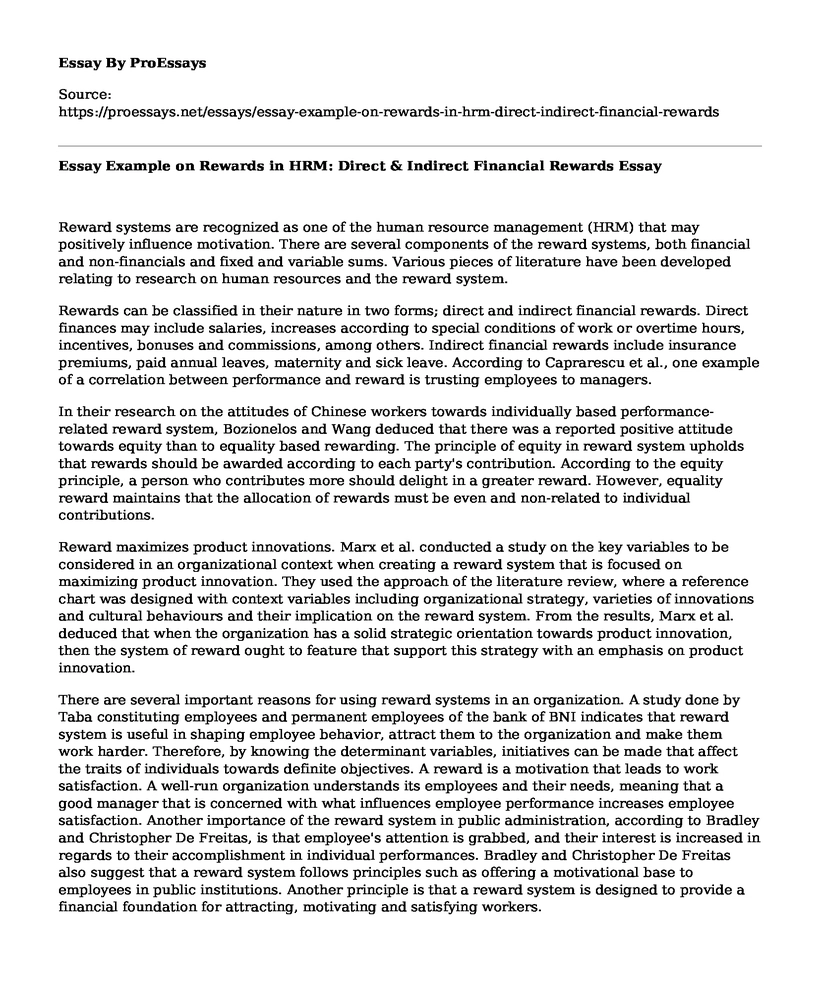Reward systems are recognized as one of the human resource management (HRM) that may positively influence motivation. There are several components of the reward systems, both financial and non-financials and fixed and variable sums. Various pieces of literature have been developed relating to research on human resources and the reward system.
Rewards can be classified in their nature in two forms; direct and indirect financial rewards. Direct finances may include salaries, increases according to special conditions of work or overtime hours, incentives, bonuses and commissions, among others. Indirect financial rewards include insurance premiums, paid annual leaves, maternity and sick leave. According to Caprarescu et al., one example of a correlation between performance and reward is trusting employees to managers.
In their research on the attitudes of Chinese workers towards individually based performance-related reward system, Bozionelos and Wang deduced that there was a reported positive attitude towards equity than to equality based rewarding. The principle of equity in reward system upholds that rewards should be awarded according to each party's contribution. According to the equity principle, a person who contributes more should delight in a greater reward. However, equality reward maintains that the allocation of rewards must be even and non-related to individual contributions.
Reward maximizes product innovations. Marx et al. conducted a study on the key variables to be considered in an organizational context when creating a reward system that is focused on maximizing product innovation. They used the approach of the literature review, where a reference chart was designed with context variables including organizational strategy, varieties of innovations and cultural behaviours and their implication on the reward system. From the results, Marx et al. deduced that when the organization has a solid strategic orientation towards product innovation, then the system of reward ought to feature that support this strategy with an emphasis on product innovation.
There are several important reasons for using reward systems in an organization. A study done by Taba constituting employees and permanent employees of the bank of BNI indicates that reward system is useful in shaping employee behavior, attract them to the organization and make them work harder. Therefore, by knowing the determinant variables, initiatives can be made that affect the traits of individuals towards definite objectives. A reward is a motivation that leads to work satisfaction. A well-run organization understands its employees and their needs, meaning that a good manager that is concerned with what influences employee performance increases employee satisfaction. Another importance of the reward system in public administration, according to Bradley and Christopher De Freitas, is that employee's attention is grabbed, and their interest is increased in regards to their accomplishment in individual performances. Bradley and Christopher De Freitas also suggest that a reward system follows principles such as offering a motivational base to employees in public institutions. Another principle is that a reward system is designed to provide a financial foundation for attracting, motivating and satisfying workers.
Conclusion
In conclusion, in the various studies that have been done to measure the influence of the reward system on employees and work, most of the results indicate that there is a direct positive influence of the reward system on work performance. For an effective workforce, organizations use the reward system as motivation in achieving strategic organizational goals.
Bibliography
Bozionelos, Nikos, and Li Wang. "An investigation on the attitudes of Chinese workers towards individually based performance-related reward systems." The International Journal of Human Resource Management 18, no. 2 (2007): 1-39. https://doi.org/10.1080/09585190601102497
Bradley, Christopher De Freitas. "Human Resource Reforms in Public Administration: The Importance of the Reward System." HOLISTICA-Journal of Business and Public Administration 8, no. 2 (2017): 1-14. https://doi.org/10.1515/hjbpa-2017-0012
Caprarescu, Gheorghita, and Catalina Bonciu. "System of Rewards-Instrument of Fundamental Human Resource Management." Manager Journal 8, no. 1 (2008): 146-151. https://ideas.repec.org/a/but/manage/v8y2008i1p146-151.html
Marx, Roberto, Joao Paulo Reis Faleiros Soares, and Lidyane Stephane da Silva Barros. "Organizational context variables to be considered in the reward system design oriented to product innovation." Revista Brasileira de Gestao de Negocios 18, no. 60 (2016). DOI:10.7819/rbgn.v18i60.2822
Taba, Muhammad Idrus. "Mediating effect of work performance and organizational commitment in the relationship between reward system and employees' work satisfaction." Journal of Management Development (2018): 1-13. https://doi.org/10.1108/JMD-11-2016-0256
Cite this page
Essay Example on Rewards in HRM: Direct & Indirect Financial Rewards. (2023, May 23). Retrieved from https://proessays.net/essays/essay-example-on-rewards-in-hrm-direct-indirect-financial-rewards
If you are the original author of this essay and no longer wish to have it published on the ProEssays website, please click below to request its removal:
- Employee Resourcing
- Essay on Proper Interview Etiquette
- Why I Want To Become a Physician Assistant? - Personal Statement
- Recruitment Planning Paper Example
- Essay on Remote Working: A Global Advantage for Tech Businesses
- Essay Sample on Conflict Theory: Karl Marx's Perspective on Social Order
- Essay on Architects' Social Responsibility: Regulating with Economic Market Conditions







